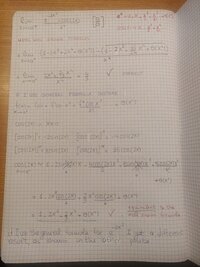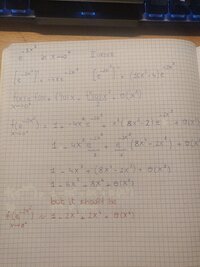Hi guys I was trying to solve this limit by expanding an exponential function to the second order in x=0 using the generic Taylor polynomial formula but I don't understand where I'm wrong.
I know the specific taylor expansion for the exponential but where am I wrong using the generic one ? Why is it different ? Also why is the rest wrong ?
I attached 2 files to explain my problem.
Sorry if my English is bad I hope you can help me.
I know the specific taylor expansion for the exponential but where am I wrong using the generic one ? Why is it different ? Also why is the rest wrong ?
I attached 2 files to explain my problem.
Sorry if my English is bad I hope you can help me.



